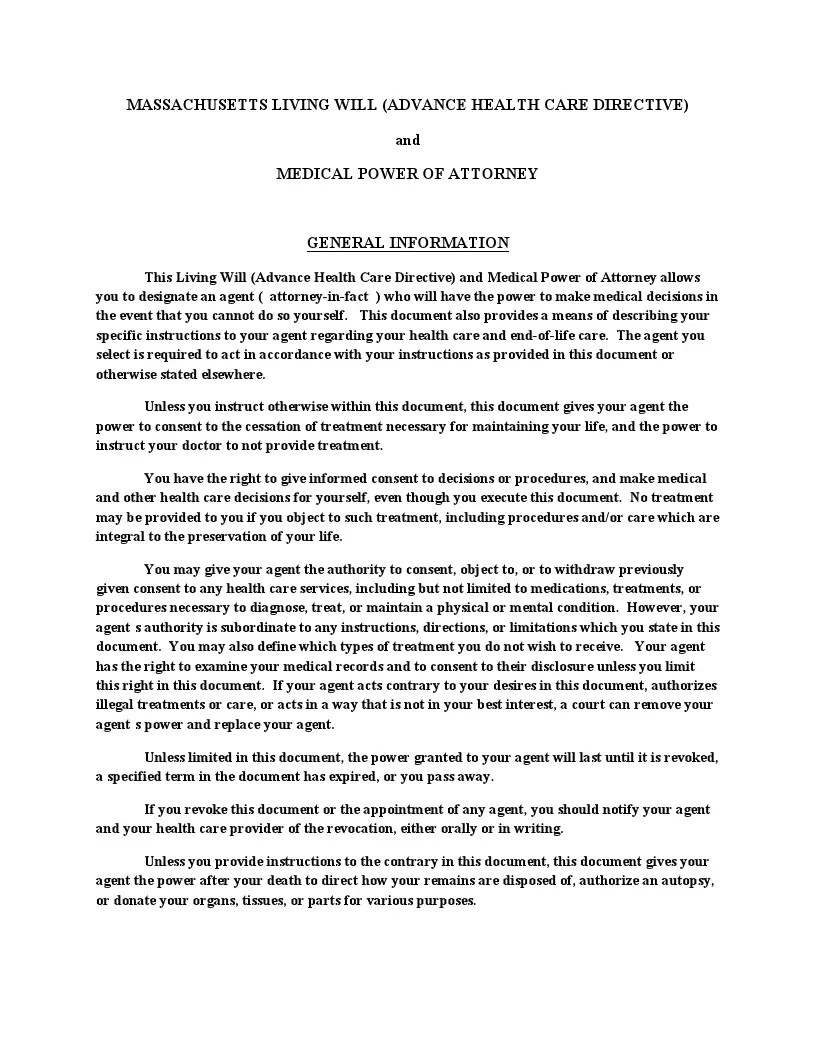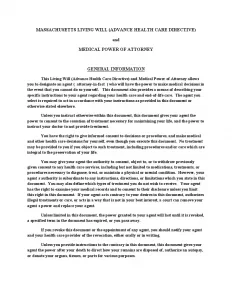Free Massachusetts Living Will Form
Although not legally binding in Massachusetts, a living will form is still an important document to consider. Massachusetts’s primary directive for end-of-life care is known as a health care proxy. In this document, you appoint someone to make healthcare decisions on your behalf if you are unable to do so.
While not legally binding, the Massachusetts living will form can still guide your doctors by outlining your preferences for medical treatment. Often used in conjunction with a health care proxy, it can provide clear instructions or insights into your values and wishes regarding end-of-life care, such as decisions about life support, resuscitation, and pain management.

Build Your Document
Answer a few simple questions to make your document in minutes
Save and Print
Save progress and finish on any device, download and print anytime
Sign and Use
Your valid, lawyer-approved document is ready
Signing Requirements and Laws
In Massachusetts, a living will form serves as a directive to your appointed healthcare agent and your medical team about your preferences in medical treatment under various circumstances, particularly in end-of-life situations. This document should be:
- Clearly written. The living will must convey your wishes regarding treatments such as life support, resuscitation, and pain management.
- Shared. To ensure your wishes are known, provide copies to your health care proxy, family members, and physicians.
While the living will isn’t legally enforceable in Massachusetts, having it alongside a legally executed health care proxy is recommended to guide your medical care decisions should you be unable to communicate your preferences. This combination helps ensure your healthcare decisions are based on your values and wishes.
The health care proxy law under Massachusetts General Laws (M.G.L. Chapter 201D) governs the legal requirements for appointing someone to make health care decisions on your behalf. The person appointing the proxy (the principal) must sign the document. The principal is a competent adult, meaning they understand what the health care proxy or living will signify and the implications of appointing someone to make health care decisions on their behalf.
The health care proxy must be witnessed by two adults who must also sign the document. These witnesses cannot be the designated health care agent, your health care provider, or an employee of a facility where you are a patient or reside.
Massachusetts Living Will Form Details
| Document Name | Massachusetts Living Will Form |
| State Form Name | – |
| Signing Requirements | Two Witnesses |
| Avg. Time to Fill Out | 13 minutes |
| # of Fillable Fields | 48 |
| Available Formats | Adobe PDF; Microsoft Word |

Steps to Fill Out the Form
Filling out a Massachusetts living will with medical power of attorney involves several steps to ensure your healthcare wishes are documented.
1. Choose Your Health Care Agent
Select a trusted individual who will act as your healthcare agent or attorney-in-fact. This person will have the authority to make health care decisions on your behalf if you are unable to do so. Ensure the chosen person is willing and capable of fulfilling your wishes.
2. Fill in Personal Information
Complete the sections of the form that require your personal information, such as your full name, address, and date. This part helps confirm your identity and the document’s applicability.
3. Specify Your Health Care Wishes
Detail your specific health care and end-of-life care preferences in the form. This section includes decisions about life-sustaining treatments, pain management, and other medical interventions. You will need to initial next to specific treatments you do or do not want to be used.
4. Appoint an Alternate Agent
It’s wise to appoint an alternate agent who can take over if your primary agent cannot fulfill their duties. Provide the name, address, and contact information for any alternate agent.
5. Document Review and Additional Instructions
Review the document thoroughly to ensure all information is accurate and reflects your wishes. You may add any additional instructions that you think are necessary to guide your agent in making decisions that align with your healthcare preferences.
6. Sign the Document
You must sign the document in the presence of two independent witnesses who will also need to sign. These witnesses must not be your appointed health care agent, related to you by blood or marriage, or directly involved in your medical care.
7. Distribute Copies
After signing the document, distribute copies to your health care agent, any alternate agents, and your primary health care provider. Keep the original document in a safe but accessible place.

Below are various other Massachusetts templates completed by our users. Try our simple builder to customize these forms to your preferences.